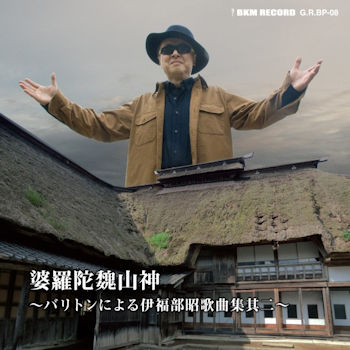

© 2024 Lawrence Tuczynski
All information courtesy of Sam Scali
| Title: | Baradagi, God of the Mountains - Akira Ifukube Film Song Anthology Part 2, for Baritone |
| CD Label: | BKM |
| CD Number: | G.R.BP-08 |
| Music Performed by: | Baritone: Tetsuro Kitamura Piano: Keiko Shimomura Drums: Weird Percussion Group (Tracks 6, 7) Backing vocals: Bukimisha Male Chorus (Tracks 5, 6, 7) (Arrangements by Takeo Yahiro) |
| Music Composed by: | Akira Ifukube |
| Number of tracks: | 14 |
| Running time: | 43:36 |
| Number of discs: | 1 |
| Year of release/manufacture: | December 31, 2023 |
| REVIEW |
September 06, 2024 This is the 8th Bukimisha CD featuring the stirring, sonorous baritone vocals of Tetsuro Kitamura, and his second to spotlight film songs composed by Akira Ifukube. As on his previous album, Mr. Kitamura is accompanied by the lovely, spirited piano work of Keiko Shimomura. The CD begins with two haunting selections from the 1958 kaiju film, VARAN THE UNBELIEVABLE, both of which focus on the monster being worshipped as a god. Kitamura's impassioned, expressive voice invokes the indigenous villagers' solemnity as well as desperation, enhancing the drama of an already dramatic score. This is followed by a tender reading of "Lullaby of a Motherless Child" from Toei Studios' animated feature,THE LITTLE PRINCE AND THE EIGHT-HEADED DRAGON (1963), and no less than four vocal cues from the 1962 Daiei film, THE WHALE GOD. Appropriately, three of those tracks are embellished by the addition of percussion and backing vocals, which emphasize their ritualistic flavor. "Apricot Flower Song", from another 1962 Daiei film, THE GREAT WALL, is a more introspective number, while ADVENTURE IN KIGAN CASTLE's "Plum Fruit" (1966) is a lively track with sprightly, staccato piano.The mood shifts once again with the mournful "Prayer for Peace" from GODZILLA (1954), featuring suitably heartfelt, emotional singing by Kitamura. "A Thousand Ancient Lullabies" from 1993's GODZILLA VS. MECHAGODZILLA continues the downbeat trend with sad, yearning vocals and sparse piano. The primitive, tribal influences return as Kitamura channels KING KONG VS. GODZILLA's Faro Island natives with two cues from the 1962 film. The first features slow, guttural vocals that are trance-like and almost deadpan, while the second cue breaks the spell with the lively, familiar chants that open the film. The album closes with a magnificent interpretation of "Mahala Mothra" from MOTHRA VS. GODZILLA (1964). The track begins with Kitamura humming the "Infant Island" theme, followed by a tense piano arpeggio that heralds a powerful, hypnotic performance of the cue. Kitamura really shows his range here, effortlessly switching from baritone to high tenor against Shimomura's pounding piano accompaniment. Once again, Tetsuro Kitamura delivers an impressive performance of songs that are rarely heard outside of their original context, and his operatic vocal talents truly bring them to life. Bravissimo! Bukimisha CDs are available to non-Japanese buyers through BOOTH (The International Indie Art Marketplace) by using a proxy service or other intermediary: https://bukimisya-maal.booth.pm/ |
|
Baradagi, God of the Mountains - Akira Ifukube Film Song Anthology Part 2, for Baritone (G.R.BP-08)
|